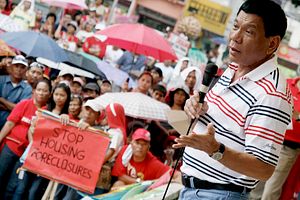After three months, election campaigning will end this week in the Philippines as more than 50 million voters will choose the country’s next president on May 9. While the next few days are crucial to ensure the victory of candidates and political parties, the major narratives of this year’s election have been laid out already. These happenings are expected to guide voters on how they will select the leaders of the country’s new government. Here are five interesting developments during the campaigns:
1. The rise of Duterte. Davao City Mayor Rodrigo Duterte was the last to announce his candidacy last year, but as of this writing, he is leading in several polls. Whether he wins or not, he has made a tremendous impact on Philippine politics. For the first time, a leader from Mindanao became the top contender for the presidency. He continued to gather attention and support in a Catholic-dominated country despite his public pronouncements that he plans to kill suspected criminals. Some believe his phenomenal rise is a reflection of public disgust against the inefficiencies of the incumbent government. Meanwhile, his supporters attribute his popularity to his pro-poor programs and his intention to dislodge elite rule in the country.
2. The return of the Marcoses. Senator Ferdinand “Bongbong” Marcos’ bid to become vice president has revived the debate as to whether his father was a hero or dictator. The elder Ferdinand Marcos ruled the Philippines for two decades, until a peaceful uprising forced the Marcos family to flee the country in 1986. Unlike in previous elections, the Marcos legacy became a major issue this year. Loyalists insist Marcos did the right thing in declaring Martial Law in 1972 because it made the country peaceful and prosperous. Naturally, anti-Marcos groups dismissed this claim as pure hogwash. Even academics issued statements reminding the public about the negative impact of Martial Law.
3. Continuity or change? In 2010, only few national candidates asked for a public endorsement from then-President Gloria Arroyo who was widely perceived to be corrupt. Her successor seems more successful in cultivating a positive image, since the majority of candidates today belong to the current administration’s party. Liberal Party presidential candidate Mar Roxas and vice presidential candidate Leni Robredo are so proud of Aquino’s accomplishments as president that they even adopted the government slogan “Daang Matuwid” (Right Path) as their official nickname on the election ballot. But for some analysts, the low ranking of Roxas in surveys is an indicator of real public sentiment against the Aquino government.
4. #Comeleak, or the hacking of voters’ data. Last month, the website of the Commission on Elections (Comelec) was hacked, though authorities downplayed its significance. A few days after, a website was launched, which appeared to contain the data of the country’s 50 million voters. Comelec officials immediately apologized and advised the public to change their emails and passwords. By this time, Comelec must have already implemented stronger security measures but the hacking is a grim reminder of the continuing vulnerability of the automated election system, which the country first adopted only in 2010. More importantly, many are worried that rich and powerful politicians will exploit the flaws in the system to manipulate election results.
5. Social media and propaganda wars. While the mainstream media continues to be the principal means of delivering election-related news to the public, social media was also aggressively used in the candidates’ propaganda wars. If television news is littered with PR stories, the Internet is flooded with fake memes, manufactured photos and videos, troll comments, and other digital weapons of mass misinformation. The situation became so intense that party leaders even advised their supporters to refrain from behaving badly online.

































